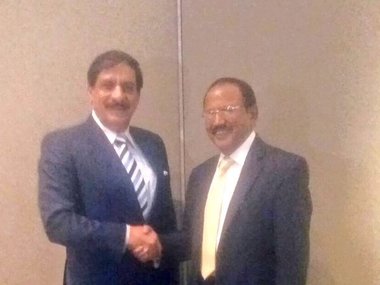By Seema Guha At long last, India and Pakistan appear to have hit the right note. National Security Advisor Ajit Doval and his Pakistan counterpart Nasir Janjua met in Bangkok, away from the media frenzy that accompanies any engagement between the two countries. Quiet conversations in neutral venues, insulated from the hype and hoopla of expectation is the best way forward for taking baby steps towards engagement between countries with a legacy of historical baggage. The NSA talks which were to follow the Ufa meeting between Prime Minister Narendra Modi and Nawaz Sharif had to be abandoned. For Sharif, it was a ‘Sharm el-Sheikh’ moment. Former prime minister Manmohan Singh was hounded — not just by the Opposition but his own party, which felt that the Indian side had conceded to Pakistan in the Egyptian resort city. There was a similar clamour after the Ufa joint statement. [caption id=“attachment_2535210” align=“alignleft” width=“380”] India’s NSA Ajit Doval with Pakistani counterpart. Twitter @MEAIndia[/caption] When it was announced that the NSAs would meet in New Delhi to discuss terror with no mention of Kashmir, there was public outrage in Pakistan. The slanging match between Islamabad and Delhi went full-throttle, with Pakistan insisting no talks were possible if Kashmir was not on the table. Delhi’s insistence that Pakistan’s NSA should not talk to the Hurriyat leaders in Delhi finally led to the 23-24 August talks being cancelled. India’s new red line on meetings with Kashmiri separatists is not acceptable to any Pakistan government. India should know that by now. Meeting away from home will help India bypass its new red line on the Hurriyat: Talks held in another country takes care of the new ground rules that the Modi government had drawn up. Terrorism and Kashmir were both on the agenda in Bangkok, making sure that hawks in either side of the border could not be the peace-breakers. Foreign secretaries S Jaishanker of India and Aizaz Ahmad Chaudhry of Pakistan accompanied their respective NSAs. The meeting ended with a short general statement: “Discussions covered peace and security, terrorism, Jammu and Kashmir, and other issues, including tranquility along the LoC. It was agreed to carry forward the constructive engagement.” The short but intense discussion Modi and Sharif in Paris had clinched the Bangkok meet. The next step is likely to be
External Affairs Minister Sushma Swaraj accepting Pakistan’s invitation to attend the ‘Heart of Asia’ meeting on Afghanistan, scheduled to take place in Islamabad this week. While the focus of the visit will be Afghanistan, Swaraj will utilise the opportunity to further the India-Pakistan dialogue. If all goes well perhaps an eventual visit by Modi next year, when Pakistan hosts the Saarc Summit. Immediately, what is expected will be the green light for India-Pakistan cricket in Sri Lanka. While Pakistan had approved the series, India is yet to do so. An approval is on the cards to help the current thaw. But with India and Pakistan nothing can be taken for granted. The best chance for continuing a serious conversation is by holding meetings away from the arch lights. India-Pakistan ties are complex and cannot be smooth sailing. However, chances of success are much better if both sides can work without the distraction of giving the right soundbites to their respective domestic constituencies. The Congress has already attacked the Modi government with spokesman Manish Tewari saying that the Modi government had no clear strategy on Pakistan. This is expected, as the Congress is bent on giving it back to the BJP in its own coin. More important for the prime minister is not what the Congress has to say, but to get the support of its hardcore supporters in the RSS and the larger family of the Sangh Parivar. Modi keen on breaking the current impasse: One thing however, is evident now. Modi is keen on breaking the impasse. In fact, even before assuming office, the prime minister is said to have sent an emissary to Pakistan. This was followed by the invitation to Sharif to attend his swearing-in. However, things did not work out then. It is not sure if it works now. Whether he succeeds or not is uncertain, but the fact that he has been trying repeatedly is an indication. Pakistanis have always believed that the best chance for peace between the two neighbours is with a hardline government like the BJP in power. The UPA under Manmohan Singh was unable to act as the BJP tore into its ‘soft’ approach to Pakistan. Congress president Sonia Gandhi perhaps because of her foreign origin, was always looking over her shoulder at the BJP, when it came to Pakistan. Modi, as a leader with a strong mandate, is in a much better position to aggressively pursue a peace agenda.
At long last, India and Pakistan appear to have hit the right note. NSA Ajit Doval and his Pakistan counterpart Nasir Janjua met in Bangkok, away from the media frenzy that accompanies any engagement between the two countries.
Advertisement
End of Article
Written by FP Archives
see more


)

)
)
)
)
)
)
)
)



